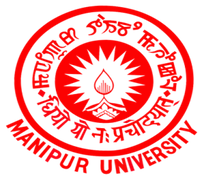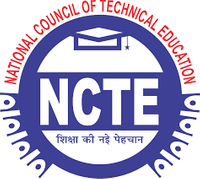B.Ed Syllabus
Critical Understanding of ICT
Unit – 1 : Information and Communication Technology
Unit – 2 : Computer Hardware Fundamentals
Unit – 3 : Computer Software
Unit – 4 : Application Software
Unit – 5 : Network and Internet
Unit – 6 : Multimedia
Unit – 7 : E-Learning
Unit – 8 : ICT Integrated lesson
Unit – 9 : ICT in assessment
Unit – 10 : ICT for Educational Management
Unit – 11 : ICT for Teacher Professional Development
Unit – 12 : E-content and open educational resources
Course Design and Editorial Committee
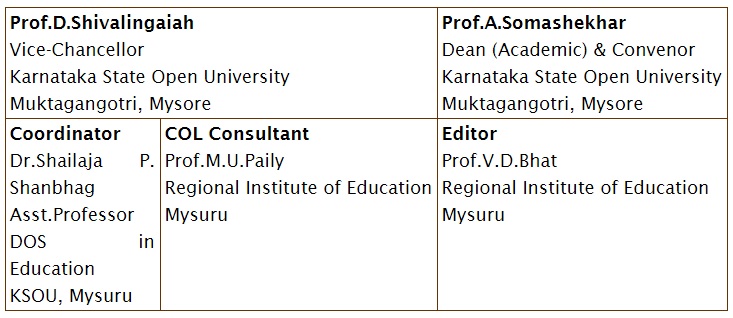
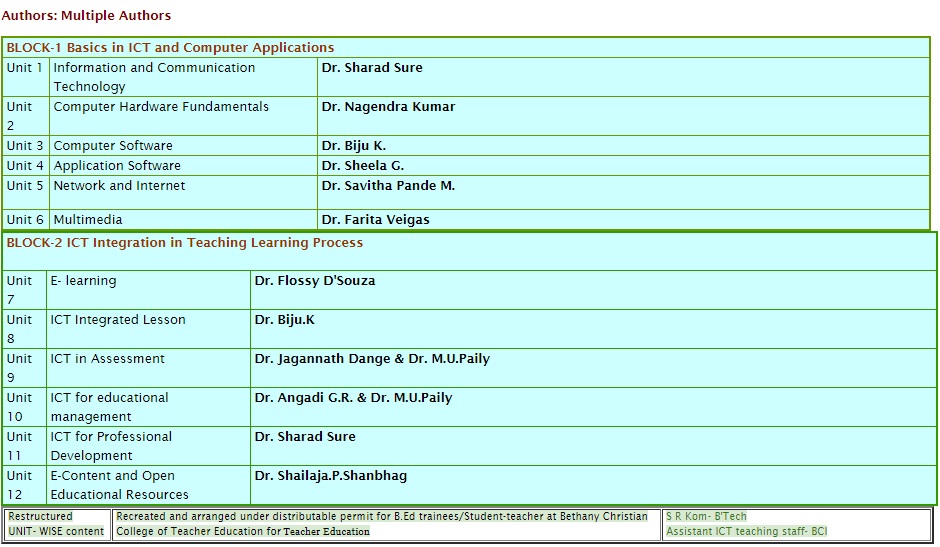
Bachelor of Education
COURSE ON CRITICAL UNDERSTANDING OF ICT
Through Blended Learning Approach
COMMONWEALTH OF LEARNING
CANADA
&
KARNATAKA STATE OPEN UNIVERSITY
MYSORE
TABLE OF CONTENTS
ACKNOWLEDGEMENT
INTRODUCTION
HOW TO USE THIS COURSE MATERIAL
BLOCK-1 BASICS IN ICT AND COMPUTER APPLICATIONS
Unit 1 Information and Communication Technology
Unit 2 Computer Hardware Fundamentals
Unit 3 Computer Software
Unit 4 Application Software
Unit 5 Network and Internet
Unit 6 Multimedia
BLOCK-2 ICT INTEGRATION IN TEACHING LEARNING PROCESS
Unit 7 E-learning
Unit 8 ICT Integrated Lesson
Unit 9 ICT in Assessment
Unit 10 ICT for educational management
Unit 11 ICT for Professional Development
Unit 12 E-Content and Open Educational Resources
ACKNOWLEDGEMENT
I would like to thank all of them who were connected with this project. I am extremely thankful to Commonwealth of Learning (COL), Canada for providing the financial support for conducting the project. I deem it my duty to place on record my deep sense of gratitude to Dr Jessica Aguti, Education Specialist, Teacher Education, COL Canada for providing me continuous guidance, support, suggestions and encouragement throughout the project. I am very much thankful to May Li of COL Canada for her immediate replies to mails and for her support. I wish to express my deep sense of gratitude to Honourable Vice Chancellor of KSOU Prof D.Shivalingaiah for extending support and encouragement. My profound thanks to Registrar of KSOU Prof.P.S.Naik for his suggestions and encouragement.I am extremely thankful to Dean (Academic) of KSOU Prof.A.Somashekhar for his support. I would like to express my deep sense of gratitude to Finance Officer of KSOU Dr. A. Khadar Pasha for his guidance, support and encouragement. My thanks to Deputy Registrar (Lessons) of KSOU Prof M.H.Krishnappa for his help in getting the ICT Course Material printed. My profound gratitude to Prof. M.U.Paily, Prof. of Education, RIE, Mysuru and COL Consultant for his help, guidance, support and for developing highly relevant and beautiful concept maps for this Course Units. I am extremely thankful to all the Unit developers for developing the units in the given short duration. I am profoundly thankful to Prof. Vasant D. Bhat for editing the units of the ICT Course. I am very thankful to Dr Kumarswamy H. Lecturer, College of Teacher Education, Mangalore for language editing of the Course Units. I would like to express my thanks to Ms. Nagalakshmi P. and Mrs. Meenalochani for their technical support and help and also for transferring all the Blended Learning Material to eXe learning. I thank my Department teaching and non- teaching staff for their help and support provided to me throughout the project.
INTRODUCTION
Knowledge is expanding rapidly and technological inventions and advances are unimaginable. A range of Information and Communication Technology (ICT) options from audio and video conferencing through multimedia delivery to digital material are available for the use of teachers. Today ICT has become an essential and indispensable tool for teaching and learning. It is a well-known fact that ICT can provide more flexible and effective ways for improving pre-service and in-service teacher training programmes and promote professional development of teachers. To use these tools effectively and efficiently teachers need to have knowledge and skills about them. Critical Understanding of ICT is one of the courses of NCTE two year B.Ed., programme for enhancing the professional capacities of student teachers. This course is meant for preparing teachers to use ICT in their classrooms. ICT will help B.Ed., Student Teachers in developing understanding about ICT and also to learn integration of technology tools for teaching and learning, material development, developing collaborative networks for sharing and learning. This course consists of two blocks with 6 units in each block and in all 12 units. The first block titled Basics in ICT and Computer Applications explains the basic concepts and related aspects of ICT. In Unit 1 you will study the meaning, nature and evolution of ICT and ICT in Education. Unit 2 describes the anatomy of computers and types of computers, hardware trouble shooting and diagnosis. In Unit 3 you will learn about Computer software, meaning and types, free open source software, MS Windows, MS Office, Open Office etc. Unit 4 explains about application software, utility tools and computer security. Unit 5 describes the network and internet concepts and architecture. In Unit 6 you will learn about multimedia and its types and use of different multimedia devices for creating and using multimedia resources. Second block of this course is titled as ICT Integration in Teaching and Learning Process which deals with the application of ICTs in education. In unit 7 you will learn about e-learning concept, types, characteristics and Learning Management System (LMS). Unit 8 describes about ICT integrated unit plan and lesson plan, Web 2.0 for creating constructivist learning environment, problem based learning, virtual field trips etc. In Unit 9 you will study about ICT in assessment such as computer assisted assessment, computer adapted testing, online assessment tools and techniques etc., Unit 10 explains about ICT for educational management, role of ICT in record keeping, time table and assistive technology for special educational needs. In Unit 11 ICT for professional development, electronic teaching, portfolio and its types, tools etc. are explained. Unit 12 deals with e-content, its design and development, open educational resources and creative commons licensing. Every unit has a common structure with sections as introduction, objectives, major content sections with inbuilt activities, self-check exercise, and links, let us sum up, and answers to check your progress, unit end exercises and references.
HOW TO USE THIS COURSE MATERIAL
This course material is developed in tune with NCTE regulations and syllabus 2014 and primarily developed for the ODL teacher trainees of Karnataka State Open University. However this course material can also be used by any teacher educationinstitutions for their pre-service and in-service teacher training programmes. In an ODL mode the course materials is made available as an online platform where the learners can access the resources anywhere anytime and involve in reading, viewing other online resources, take up the self-check exercises, collaborate with other learners and evaluate themselves. The course material will also be provided in a printed format with digital version of the same in a CD. However this will have the limitation in using other linked online resources. Those interested can also convert/export the course in to SCORM or an IMS package and deliver it through the LMS platform as an e-learning course. In order to facilitate this, CD will have the source file developed using an open source authoring tool eXeLearning. This software can be downloaded and installed from exelearning.net and using this, users can export each module in to SCORM/IMS package to deliver through LMS. Throughout the modules there are many activities, exercises, check your progress, and unit end evaluation exercises which require an active involvement of the learners in the learning process. There are also many video tutorials links to make the process clear to the learners. It is expected that courses providers ensure that the learners maintain an online portfolio either as a blog or as a standalone e-portfolio system to showcase and reflect on their learning process. It is also important that they have an online interactive forum either as a Google group or standalone online forum to facilitate interaction among the fellow learners. All this could also be achieved through a fully loaded eLearning LMS platform. Though the learners are expected to have hands-on practices at their own place of learning using the video tutorials, they need to be provided with practical activities during the contact programmes. The details of how to implement this during the distance learning phase and contact programme phase is given in the table below. Traditional teacher education programmes can also use this material as self-learning resources for their leaners and provide them hands on experiences in the computer laboratory during the scheduled periods.
Practical activities during the Distance Learning Phase and Contact Programme and their Assessment
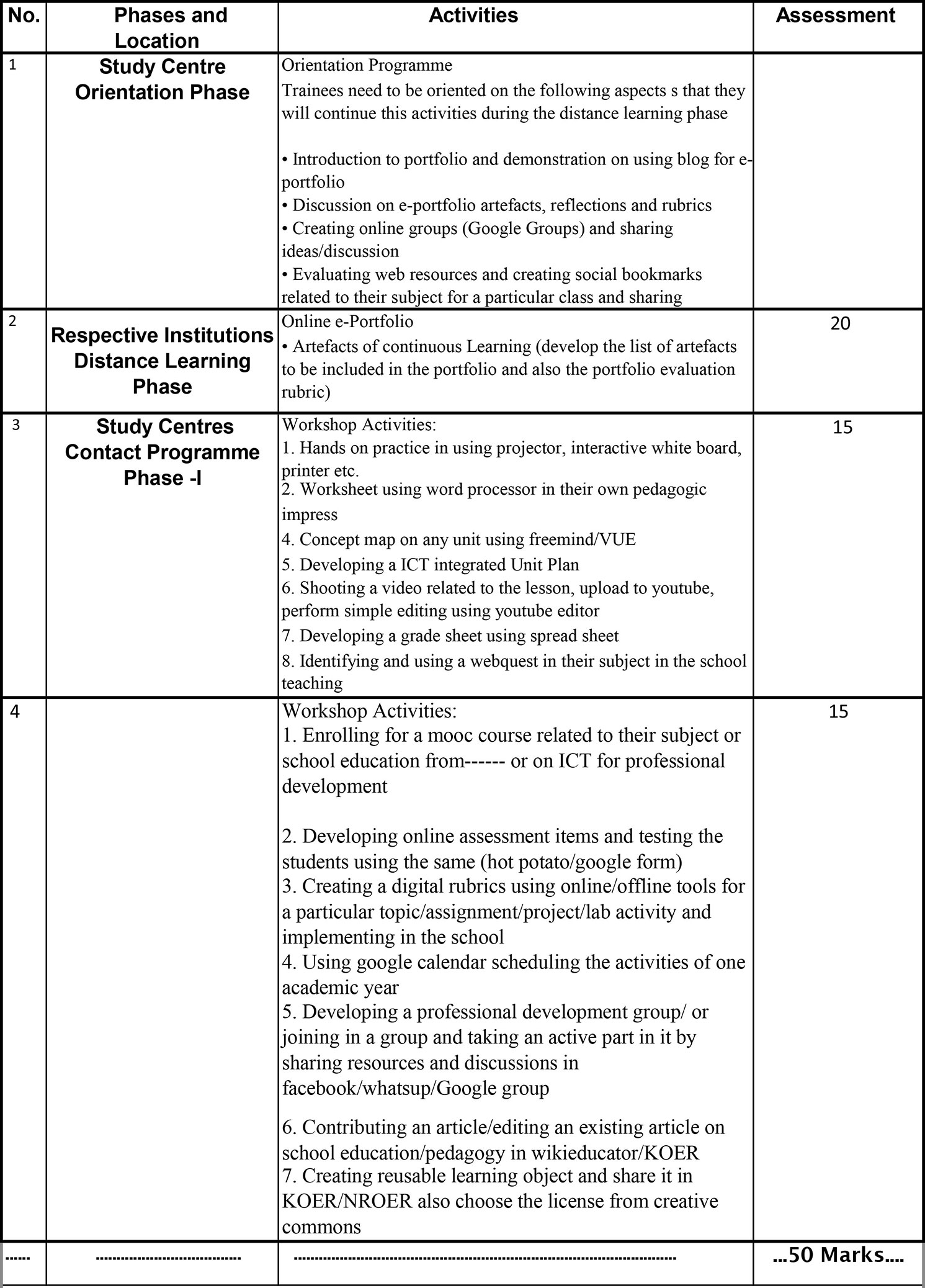
Table 3
College programs
Years Established
Faculty
Students
Get In Touch
Family Lane, Bijang, Teddim Road, Post Box No. 23
Churachandpur, PIN -795128, Manipur, India
Contact Numbers:
+91 8794256802, 7005489311 (10 AM- 4.30 PM)
Email: bethanychristianinstitute@gmail.com
Quick Link
1. Manipur University
2. COHSEM
3. NCTE
4. NSS
5. NCC

